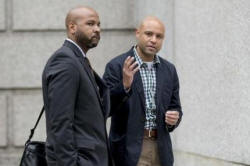|
 SEC
can pursue insider trading case against brokers: judge SEC
can pursue insider trading case against brokers: judge
 Send a link to a friend
Send a link to a friend
[September 12, 2015] By
Joseph Ax
NEW YORK (Reuters) - Two New York
stockbrokers must face civil insider trading charges brought by U.S.
securities regulators, a U.S. judge ruled on Friday, despite a landmark
appellate ruling that torpedoed the criminal case against them.
|
|
 U.S. District Judge Jed Rakoff in Manhattan rejected a bid from
former Euro Pacific Capital Inc traders Daryl Payton and Benjamin
Durant to throw out U.S. Securities and Exchange Commission charges
that they engaged in illegal trading ahead of an IBM Corp <IBM.N>
deal. U.S. District Judge Jed Rakoff in Manhattan rejected a bid from
former Euro Pacific Capital Inc traders Daryl Payton and Benjamin
Durant to throw out U.S. Securities and Exchange Commission charges
that they engaged in illegal trading ahead of an IBM Corp <IBM.N>
deal.
However, Rakoff postponed the scheduled Sept. 21 trial with the
parties' consent while the U.S. Supreme Court weighs whether to
review the appellate ruling, which could affect the SEC case's
outcome.
Gregory Morvillo, a lawyer for Durant, and Matthew Fishbein, a
lawyer for Payton, declined to comment on Rakoff's ruling, as did a
spokeswoman for the SEC.
The brokers had argued that the case must be dismissed in light of a
December decision by the 2nd U.S. Circuit Court of Appeals in New
York that curtailed authorities' ability to pursue insider trading
cases.
In reversing the convictions of hedge fund managers Todd Newman and
Anthony Chiasson, the appeals court held that prosecutors must prove
a trader knew that the source of a tip received a benefit in
exchange.
The 2nd Circuit also narrowed the definition of "benefit," saying it
had to be more than mere friendship.
The Justice Department has asked the U.S. Supreme Court to review
the ruling; the court has not yet decided.
In the current case, authorities said a lawyer representing IBM in
2009 told Trent Martin, an analyst at Royal Bank of Scotland Group
Plc, that the company planned to acquire SPSS Inc for $1.2 billion.
Martin bought SPSS stock and told his roommate, Euro Pacific broker
Thomas Conradt, who in turn shared the information with co-workers
Durant, Payton and another man named David Weishaus, all of whom
traded on the tip.
[to top of second column] |

All five men were criminally charged, and all but Durant pleaded
guilty. But a federal judge threw out their guilty pleas following
the 2nd Circuit's ruling, and prosecutors dropped the case.
The SEC, however, pressed forward against Durant and Payton, citing
a different legal standard for civil charges.
The defendants argued they were too far removed from the original
source to meet the 2nd Circuit's standard. But the SEC said they
willfully ignored red flags, proving they knew the information was
illegally obtained.
The case is U.S. Securities and Exchange Commission v. Payton et al,
U.S. District Court for the Southern District of New York, No.
14-4644.
(Reporting by Joseph Ax; Editing by Bernard Orr and Chris Reese)
[© 2015 Thomson Reuters. All rights
reserved.] Copyright 2015 Reuters. All rights reserved. This material may not be published,
broadcast, rewritten or redistributed.
 |